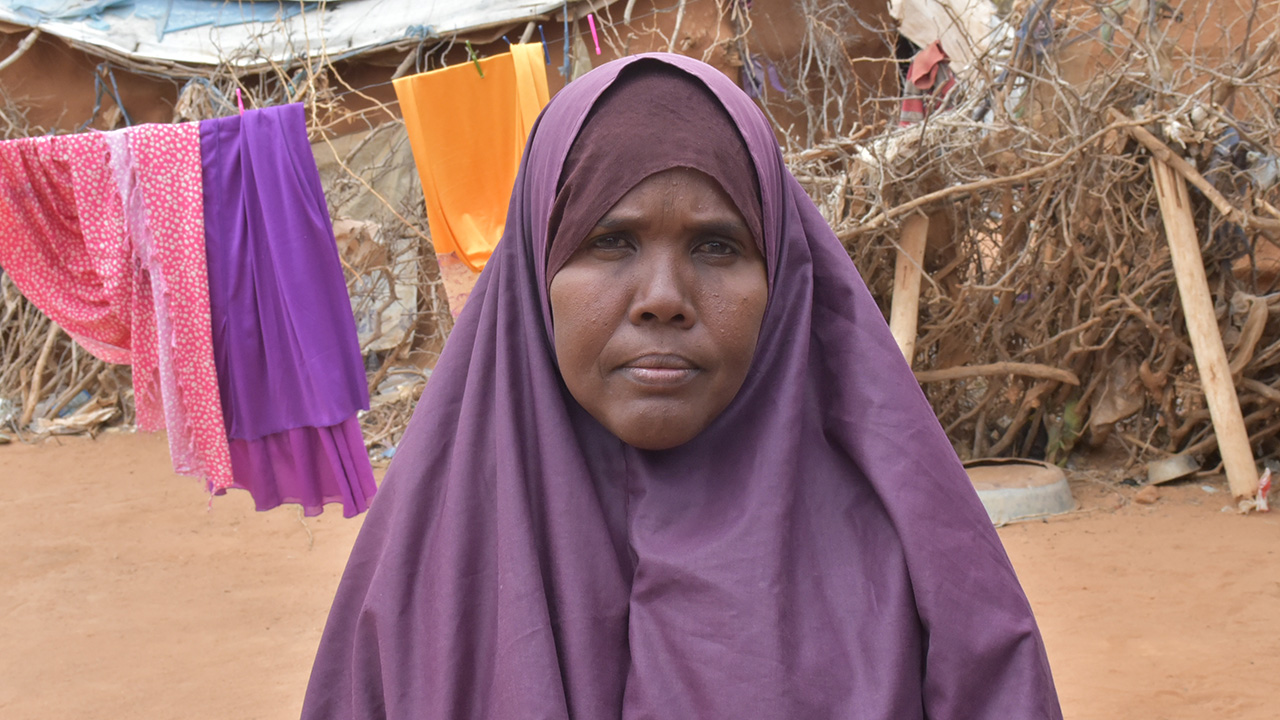A section of Dadaab refugee camp on March 8
Hundreds of thousands of Somali refugees living in Dadaab, the world’s largest refugee camp in northern Kenya, face a bleak future if the government of Kenya goes ahead with its plan to close the camp on 30 November.
If the Kenyan government sticks to its resolution, people will be uprooted to return to war-ravaged Somalia where they’re likely to face dangers from which they fled in the first place.
A new report released by Doctors Without Borders (MSF) this week, ‘Dadaab to Somalia: Pushed Back into Peril, indicates thatmore than eight out of 10 refugees surveyed by MSF do not want to return for fear of being forcefully recruited into armed groups, being sexually violated and having no access to healthcare.

Sahara Abdirahman. Photo: Mohamed Ali
“I fear repatriation to Somalia because I know the kind of life I have had there. There is nothing in Somalia. Let us not lie about the situation. I hear the news in the media. I do not live in luxury here, but at least I sleep peacefully,” says Sahara Abdirahman, a Somali refugee in Dagahaley camp.
In the report, MSF highlights the severe medical consequences of such a massive return.
An acute lack of medical care
In Dagahaley, one of the five camps which make up Dadaab, MSF medical teams have seen children arriving from Somalia having not been vaccinated against a range of preventable diseases. This is an indication of a health system torn apart by more than two decades of war, where even basic care is barely existent.
Pregnant women will have minimal care, putting their own lives and their unborn babies under threat. On the other hand, people with chronic medical conditions like diabetes and hypertension who need ongoing treatment are also at risk.
Mental health patients are equally in danger if they miss their medication. In Dagahaley, 70% of MSF’s mental health patients are on medication.
“If a patient with psychosis is forced to come off their medication, their cognitive function and behaviour development goes into reverse. Stuck in a country where mental health services are basically non-existent would put their lives in severe jeopardy,” says Liesbeth Aelbrecht, Head of Mission for MSF in Kenya.
MSF’s call on Kenya, UNHCR and donor countries for alternative solutions
Doctors Without Borders (MSF) is sending an urgent call to the Kenyan government to consider alternative and long term solutions in resolving this issue rather than sending hundreds of thousands of Somalis back into the peril of the war-ravaged country they fled from.
MSF suggests that smaller camps be established in Kenya, refugees be resettled in third countries or that they should be integrated into Kenyan communities.
“It is unacceptable that – without any other solution being offered – thousands are essentially being pushed back into conflict and acute crisis: the very conditions they fled,” says Aelbrecht. “Kenya should not shoulder this burden alone. Funding from donor countries needs to be directed to providing sustained assistance in the country of refuge, not to support what will essentially be a forced return to a warzone,” adds Aelbrecht.
Background of Dadaab
Dadaab has been home to 277 000 refugees from Somalia, Ethiopia and Sudan for 25 years. It was established in 1991 when conflicts in neighbouring Ethiopia, Sudan and Somalia forced thousands to flee Kenya.
The government of Kenya announced the closure on May 6, 2016 citing national security reasons and decreased international funding for refugee assistance.
This announcement threw into question the tripartite agreement signed between the governments of Kenya, Somalia and the UN High Commission on Refugees back in November 2013, which outlined the terms for repatriation of refugees to Somalia, but only on a voluntary basis.
MSF has spoken on several occasions against different countries and their efforts to wilfully push back refugees and asylum seekers into the peril they fled from, and outsourcing the care of refugees elsewhere.